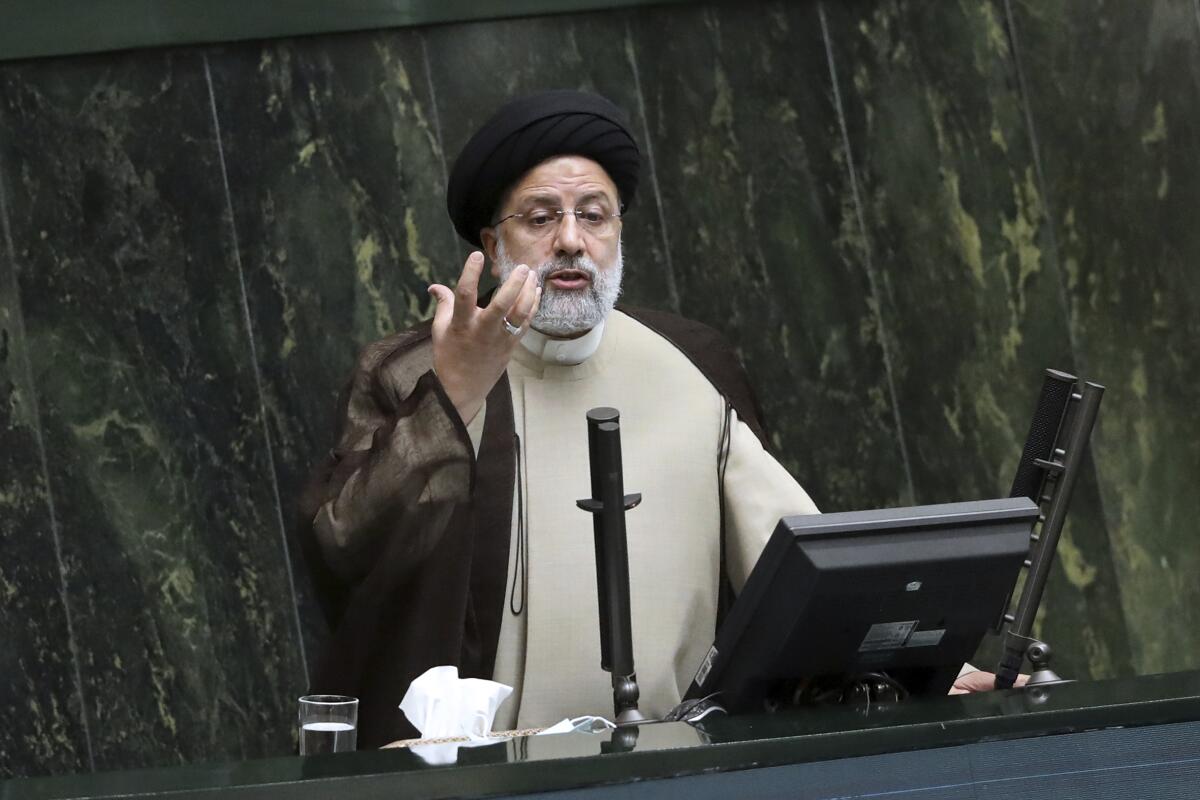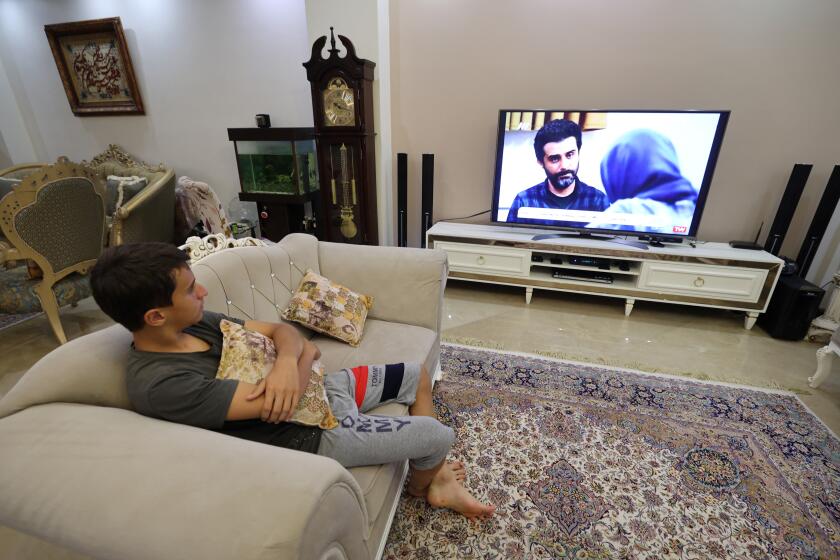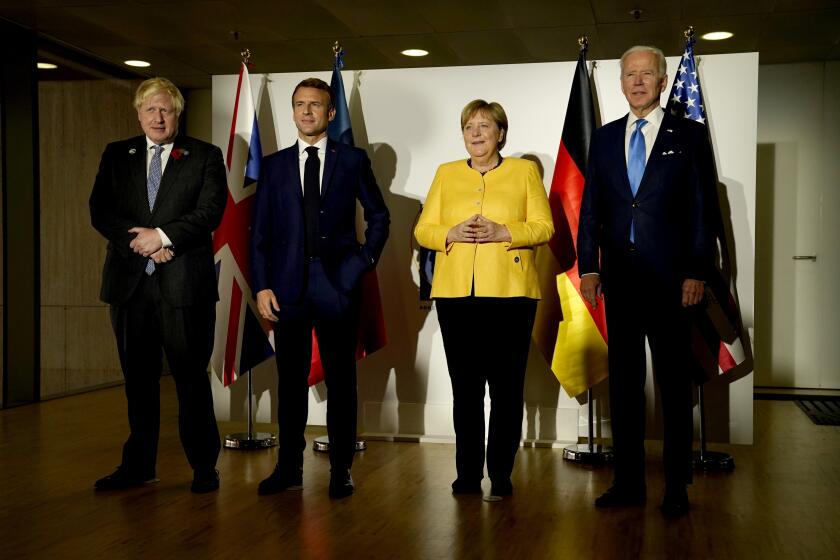Iran takes a hard line in new round of nuclear talks

- Share via
TEHRAN — Iran struck a hard line Tuesday after just one day of restarted talks in Vienna over its tattered nuclear deal with world powers, suggesting that everything discussed in previous rounds of diplomacy could be renegotiated.
Speaking to Iranian state television, Ali Bagheri, Iran’s top nuclear negotiator, referred to everything discussed thus far as merely a “draft.” It remained unclear whether that represented an opening gambit by Iran’s new hard-line president or signaled serious trouble for those hoping to restore the 2015 deal that saw Tehran strictly limit its enrichment of uranium in exchange for the lifting of economic sanctions.
The U.S. left the deal under then-President Trump’s “maximum pressure” campaign against Tehran in 2018. Since the deal’s collapse, Iran now enriches small amounts of uranium up to 60% purity — a short step from weapons-grade levels of 90%. Iran also spins advanced centrifuges barred by the accord, and its uranium stockpile now far exceeds the accord’s limits.
President Biden has said that the U.S. is willing to re-enter the deal. The negotiations are taking place with U.S. officials on the sideline because of Washington’s withdrawal from the accord.
“Drafts are subject to negotiation. Therefore nothing is agreed on unless everything has been agreed on,” Bagheri said. “On that basis, all discussions that took place in the six rounds are summarized and are subject to negotiations. This was admitted by all parties in today’s meeting as well.”
That directly contradicted comments Monday by the European Union diplomat leading the talks.
‘Gando,’ a ‘Homeland’-like hit TV series in Iran, is a sophisticated ploy by ultra-conservatives to torpedo delicate nuclear talks with the West.
“The Iranian delegation represents a new administration in Tehran with new, understandable political sensibilities, but they have accepted that the work done over the six first rounds is a good basis to build our work ahead, so no point in going back,” Enrique Mora said.
Another state TV segment saw Bagheri in Vienna saying that Iran demanded a “guarantee by America not to impose new sanctions” or reimpose previously lifted sanctions.
Mohammed Eslami, the country’s civilian nuclear chief, reiterated that demand in comments to Iran’s state-run IRNA news agency.
“The talks are about return of the U.S. to the deal and they have to lift all sanctions, and this should be in practice and verifiable,” he said. He did not elaborate.
President Biden, meeting with European leaders to plot strategy for nuclear talks with Iran, offers to lift sanctions if Tehran ‘changes course.’
The U.S. has imposed a slew of sanctions on Iran since the 1979 takeover of the U.S. Embassy in Tehran. Some eventually directly dealt with the country’s nuclear program, while others targeted Tehran for what Washington describes as destabilizing actions in the Mideast. Under the 2015 nuclear deal, the U.S. lifted nuclear sanctions, which returned when Washington pulled out of the accord.
Iran maintains that its atomic program is peaceful. However, U.S. intelligence agencies and international inspectors say Iran had an organized nuclear weapons program up until 2003. Non-proliferation experts fear that any brinkmanship could push Tehran toward even more extreme measures to try to force the West to lift sanctions.
Making matters more difficult, United Nations nuclear inspectors remain unable to fully monitor Iran’s program after Tehran limited their access. A trip to Iran last week by the head of the International Atomic Energy Agency, Rafael Grossi, failed to make any progress on that issue.
The talks in Vienna resumed Monday after a hiatus of more than five months. The new Iranian president, Raisi, a protégé of Supreme Leader Ayatollah Ali Khamenei, campaigned on getting sanctions lifted. However, fellow hard-liners within Iran’s theocracy long have criticized the nuclear deal as giving too much away to the West.
Start your day right
Sign up for Essential California for the L.A. Times biggest news, features and recommendations in your inbox six days a week.
You may occasionally receive promotional content from the Los Angeles Times.
Mikhail Ulyanov, Russia’s top representative to the talks, tweeted Tuesday that the resumption of negotiations was “quite successful.”
“Participants decided to continue without delay the drafting process in two working groups — on sanctions lifting and nuclear issues,” he wrote. “This work starts immediately.”
Israel, Iran’s regional, nuclear-armed rival, kept up its own pressure amid the negotiations. Israeli Prime Minister Naftali Bennett, in a video address delivered to the nations negotiating in Vienna, warned that he saw Iran trying to “end sanctions in exchange for almost nothing.”
“Iran deserves no rewards, no bargain deals and no sanctions relief in return for their brutality,” Bennett said in the video, which he later posted on Twitter. “I call upon our allies around the world: Do not give in to Iran’s nuclear blackmail.”
More to Read
Sign up for Essential California
The most important California stories and recommendations in your inbox every morning.
You may occasionally receive promotional content from the Los Angeles Times.












